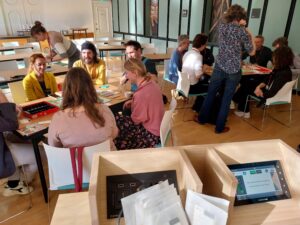Coordinator: Stefan Werning
Co-coordinator: Laura op de Beke
Members: Timo Fluitsma, Federico Andreotti (affiliated; WUR)
Learning Goals
* Understanding how games contribute to sustainable future imaginaries through worldbuilding, rule systems, and player interaction.
* Modifying popular board/card game franchises to express personal viewpoints and critique/respond to messages built into the original games through design (‘competence’).
Processing information about real-world climate threats and solutions, translate them into coherent game worlds and rules and use game modifications as tools to foster productive climate communication.
Experiencing increased ‘agency’ by collectively prototyping alternative social imaginaries.
Following Ghosh and Bendor’s analysis of the climate crisis as a ‘crisis of imagination’, WP3 enables students to build resilience by more concretely (re)imagining sustainable futures, i.e. collaborating on “alternative imaginar[ies]” (Bendor 2018). Instead of doing this as an abstract thought experiment, our approach involves modifying (‘hacking’) popular commercial game franchises personally meaningful to students. Together with the Utrecht Gamelab (http://gamelab.sites.uu.nl/), we develop workflows using digital and physical prototyping tools to ‘hack’ iconic board and card game franchises The Game of Life, Cities: Skylines and Magic: The Gathering in class.
In the courses Green Media (ME3V19001) and Serious Games en Gamification (ME3V21006) as well as online workshops co-organized with Wageningen University Games Hub (led by Andreotti), we refine the method by collaboratively creating, playtesting, and analysing sample modifications (mods), the emerging sustainable future imaginaries and students’ emotional and cognitive responses.
Following the ‘discursive game design’ paradigm, which conceptualizes game modifications as an ongoing societal discourse, we document archive and document mods throughout and beyond the project’s duration via the Green Mediography (https://greenmediography.nl/), facilitating a dialogue across faculty borders but also student ‘generations’. Thereby, students develop a sense of ‘relatedness’ not just with their immediate peers but with earlier and later cohorts, i.e. their academic community.


